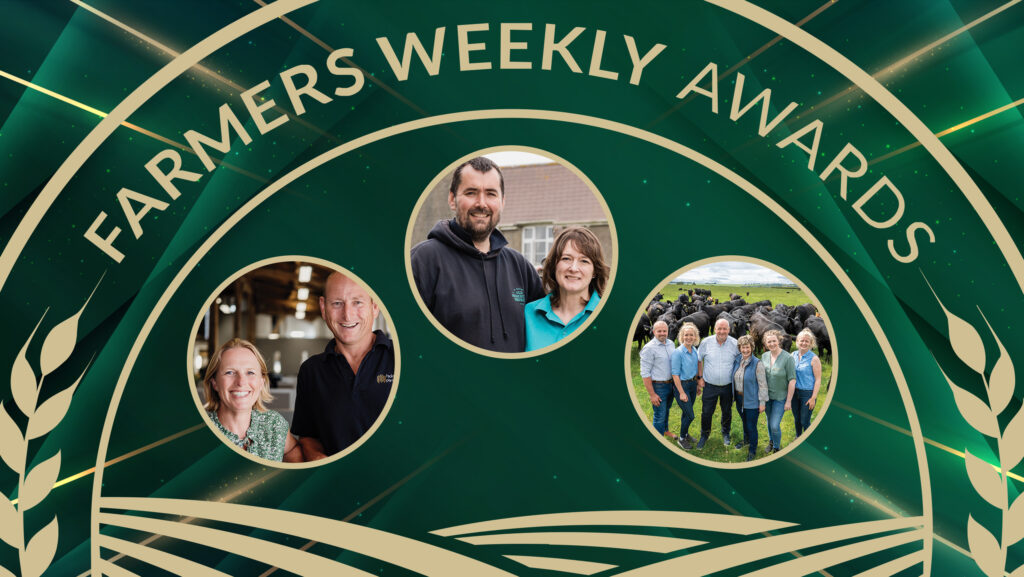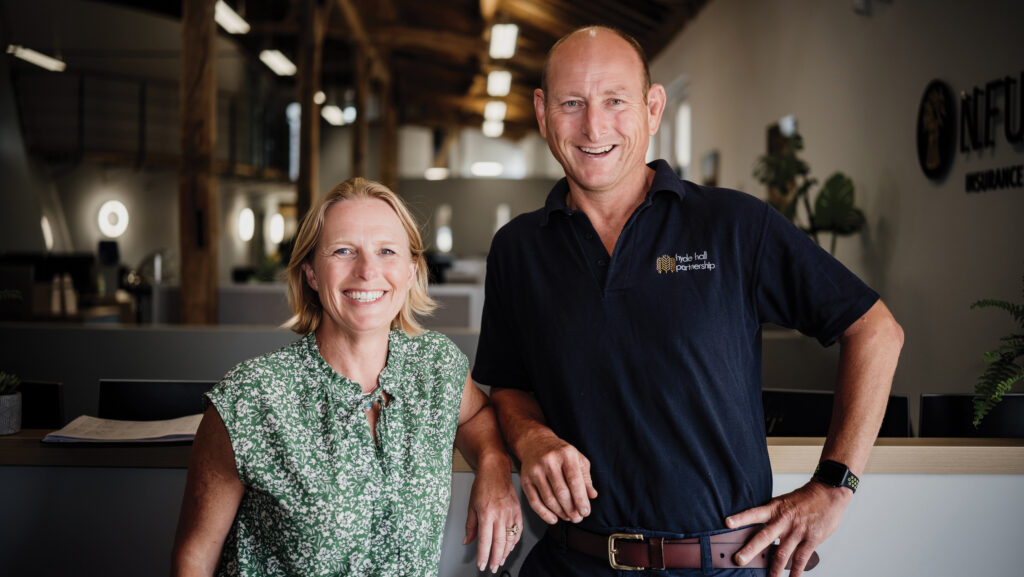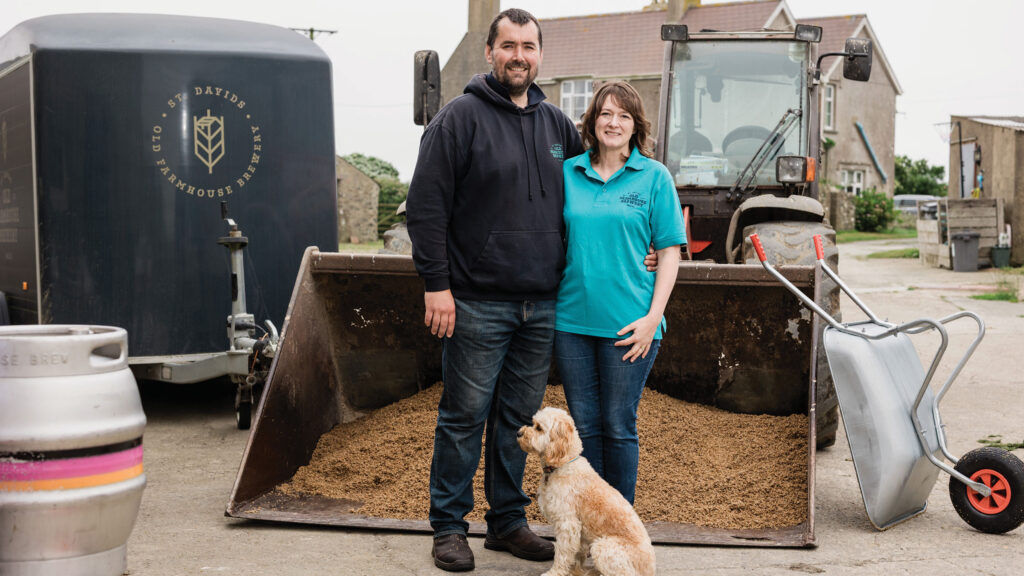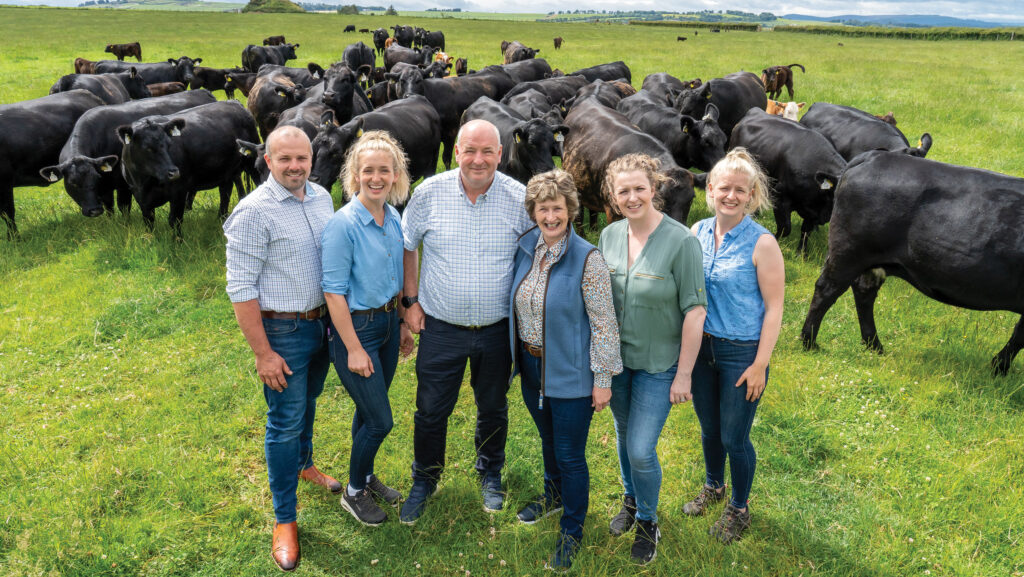FW Awards: Meet the 2025 Diversification Farmer of the Year finalists
 Ben and Fiona Cannon, Mark and Emma Evans, The Marshall Family © Colin Miller/MAG, John Wellings, Angus Findlay
Ben and Fiona Cannon, Mark and Emma Evans, The Marshall Family © Colin Miller/MAG, John Wellings, Angus Findlay All of this year’s finalists have built up diversified enterprises that complement and add value to their farm businesses.
See also: FW Awards 2025: Meet the finalists
Finalists
-
Ben and Fiona Cannon Hyde Hall Partnership, Hertfordshire
-
Mark and Emma Evans, St Davids Old Farmhouse Brewery, Haverfordwest
-
The Marshall family, Marshall’s Farm Shop,Inverurie
The judges
-
Nick Evans – Independent judge and co-founder and managing director at Oxbury Bank, Nick has vast experience working with farming diversifications.
-
Tom Mellor – Last year’s finalist, Tom, established Wold Top Brewery and Filey Bay whisky, using home-grown cereals from his Yorkshire farming enterprise.
-
Charlie Reeve – Farmers Weekly’s markets editor has a background on his family’s beef and sheep enterprise and farm shops in Warwickshire.
Ben and Fiona Cannon, Hyde Hall Partnership, Hertfordshire

Ben and Fiona Cannon © MAG/Colin Miller
Hyde Hall Farm has transformed over 30 years from a traditional family farm into a large arable enterprise with a diversified portfolio of offices, industrial units and residential lets.
The conversion of obsolete farm buildings for commercial use was initially carried out to provide a passive income stream alongside farming operations, and provide additional revenue to help buy out other
family members.
Over the years, the farmyard has grown to house more than 20 business tenants across 3,400sq m, including rural solicitors, insurers and upholsters, with more than 100 people working on-site each day.
Ben and Fiona Cannon have worked meticulously to transform the site, with Ben overseeing business development and Fiona using her skills as a chartered surveyor to manage planning procedures and tenant negotiations.
The couple have funded the projects by borrowing against the value of land to “sweat the asset” and in turn have created a modern rural business hub.
They have also diversified with a log processing business, delivering more than 200cu m of logs a year locally.
Investment into solar on shed roofs currently produces 50kW of energy, with a further 50kW planned, as well as battery storage.
The business generates further revenue by hosting dog training schools, clay pigeon shooting club sand large-participation running events on-farm.
Fiona says they have been able to spread the financial risk by having a wide breadth of diversified businesses and they have ensured that every part of the farm is viable, relevant, and used effectively.
Farming operations
Roughly 1,000ha of arable land is farmed in total, which includes 200ha of owned arable ground, 20ha of grassland and 20ha of woodland, with the rest on contract farming agreements with four local landowners.
A fencing contracting and groundworks enterprise runs alongside farming operations, which keeps farmworkers busy during the winter months.
The business typically employs three to five employees year-round. Ben says: “The amenity business utilises farm labour, with staff returning to work at harvest, drilling and other busy periods.
For around 75% of the year they are off farm, fencing, doing groundworks or carrying out amenity work for a customer base of more than 500 people and businesses.”
Regenerative practices are used on farm, with private sector funding being provided for environmental actions by corporate organisations, such as Unilever and Whitworths as well as water companies.
Sheds are used to house cattle in the winter on a bed-and-breakfast agreement, which also provides muck for the land.
Ben says: “We use the silage and straw off the farm here and charge a headage rate.”
More than 5km of new hedgerows and 1ha of young woodland have been planted as part of environmental schemes, along with the restoration of three historic ponds and the introduction of permissive footpaths.
Future plans
After more than a decade of continuous growth, Ben and Fiona plan to take a break from building projects in the short term and focus on managing existing operations.
Looking forward, the couple aim to pass on the business to the next generation and encourage open conversations about succession.
Ben says: “By having multiple business interests, we safeguard ourselves, as when one has a bad year, hopefully others will not.”
The numbers
-
1,000 total farmed area (ha)
-
3,400 business space (sq m) created by converting historic farm buildings
-
100 number of people working on-site each day
-
50 energy generated from solar (kW)
-
40 length (km) of stock fencing erected for customers in past two years
Farm facts
-
Contracting business started in 1995
-
Regenerative farming practices backed with private sector funding
-
Plans to expand solar offering to 100kw
-
More than 20 commercial tenants on-site
-
Sheds used to house cattle during winter months on a bed-and-breakfast agreement with local farmer
The judges liked
- Clear vision for both short-term and long-term growth with focus on
succession planning - Management of staff across both farming and commercial property enterprises
- Sustainable initiatives on farm
- Use of both public and private sector funding
What the judges say
Ben and Fiona both share a brilliant entrepreneurial mindset. They have created a truly state-of-the-art business park and farming enterprise, with a plethora of innovative revenue streams.
Mark and Emma Evans, St Davids Old Farmhouse Brewery, Haverfordwest

Mark and Emma Evans © John Wellings
Welsh livestock farmers Mark and Emma Evans have converted old stone farm buildings on their farm near St Davids, Pembrokeshire, into a brewery and holiday lets.
The brewery was established in 2020 as a way to future-proof the farm and tap into the local tourism market.
They now produce seven beers, including a milk stout, two lagers, a wheat beer and three bitters.
These are stocked in local pubs and retail stores, as well as Fortnum & Mason.
The brewery has a bar which is open to the public, selling draught beer on tap to customers, as well as bottled beers to a passing tourist trade.
It also doubles up as an events venue, regularly hosting live music and private functions.
Spring water from the farm is used in the brewery, and an air source heat pump and solar panels have been installed to help cover running costs.
Mark says: “We brew and bottle everything on-site, and use local ingredients such as our own honey, local seaweed, and local sea salt, so everything happens within a few miles of our farmyard.
“During the winter, the farm is busy with cattle indoors, and generally the brewery is quiet.
“Once the cattle go out in the spring, this is when the brewery trade starts to pick up, peaking in August and then declining again in the autumn and winter.”
The farm has some of its own cattle processed by a local butcher, which it then sells through its Dewisland beef box scheme, with cuts of beef sold direct to consumers at the brewery.
Farming operations
The farming enterprise runs across three sites within a five mile area, with 220ha owned and a further 100ha rented close by.
Roughly 250 Aberdeen Angus-cross dairy calves are reared on farm each year, with typically between 600 and 800 cattle on the main farm holding at any one time.
Youngstock are fattened and sold as finished cattle directly to an abattoir, as part of a premium scheme for Angus beef with M&S and Tesco.
The farm also has an award-winning herd of pedigree Simmental cows and a commercial Angus herd.
Mark says: “We’ve simplified the farming operation in recent years to reduce the arable enterprise to a bare minimum and we are now an efficient grass-based beef finishing unit.”
Fertiliser usage has been cut dramatically on farm in a bid to reduce input costs, with just 15t of nitrogen purchased last year, compared with about 120t five years ago.
“The cattle give us manure to fertilise the land where we can grow malting barley, with the spent brewers grains being fed back to our herd,” says Mark.
One full-time farmworker is employed, who carries out much of the tractor work on farm.
Future plans
Mark and Emma plan to expand their offering so they have a range of 10 consistent beers available to customers.
They also hope to invest in a purpose-built bottling unit within the next five years and to upgrade the existing two-head filler to a larger capacity machine to reduce bottling time.
Mark says: “We will also strive to continue to improve our environmental impact, and we intend to plant a wildflower meadow in the field adjacent to our bee hives.
“We are also in the process of improving access to our moorland, so that visitors to the brewery can enjoy the farmland that supports us.”
The numbers
- 320 total farm size (ha)
- 250 Aberdeen Angus- cross calves reared annually
- 100 number of pedigree Simmental cattle
- 15t of nitrogen fertiliser used annually
- 7 different beers currently sold in range
Farm facts
- Previous winners of best large herd and best overall herd within the Welsh Simmental club
- Holiday lets provided first business diversification 10 years ago
- Grant funding awarded through the Food Business Investment Scheme, as part of the Welsh government’s Rural Development Programme
- Works with other local businesses to secure ingredients for brewing, such as seaweed
The judges liked
- Excellent management of calf-rearing enterprise
- Partnerships with local businesses to source brewing ingredients
- Direct sales through beef box scheme
- Strategic plans for growth of existing operations
What the judges say
Alongside their highly efficient grass-based beef enterprise, Mark and Emma have established a superb brewery and events venue, with strong potential for growth both on-site and at retail.
The Marshall family, Marshall’s Farm Shop, Inverurie

Left to right: Craig Stuart, Julie Stuart, Kenneth and Moira Marshall, Christine Mackintosh, and Shona Marshall © Angus Findlay
Marshall’s Farm Shop started out as a self-service trailer 20 years ago and has grown into an extensive farm shop with a restaurant, butchery, gift shop and drive-thru.
The Marshall family have scaled up operations dramatically and now employ roughly 125 members of staff at the farm shop, as well as seven employees on the farm.
Kenneth and Moira Marshall run the business alongside their three daughters Christine, Julie and Shona.
Christine focuses on commercial aspects of the business, Julie heads up the restaurant, and Shona oversees farming operations and the butchery.
The farming enterprise and shop are intertwined, with roughly two lambs, four beef carcasses and five pigs a week sold through the butchery and restaurant.
Eggs, potatoes, and fresh vegetables are also produced on-farm.
The restaurant can do up to 800 covers on a Sunday, and 95% of the ingredients in the Sunday roast lunch are reared or grown on the farm.
The addition of the restaurant also allows the butchery to use excess cuts of meat in other products, such as pies.
Kenneth says after being a “price taker” for many years as a dairy farmer, the family decided they were going to change the farming enterprise and sell their own produce direct to customers.
This has allowed them to price it and be in control.
A number of solar panels have been installed across the back of the building, which covers most of the electricity usage during the day.
Other diversifications include dog walking fields, a dog grooming facility, and
children’s play area.
The family also generate rental income from a number of residential properties and commercial units in the local area.
A trailer repair workshop operates alongside the farm business with roughly 150-200 agricultural trailers being refurbished each year.
Farming operations
Roughly 1,000ha of land is farmed across two sites.
This is predominantly grassland for livestock, along with 350ha of arable ground, 5ha of potatoes, and 2.5ha of carrots, cauliflower, and cabbage.
Daughter Shona says the farm grows wheat, malting barley and feed barley. Some of the wheat is used for feeding the chickens and pigs, and the feed barley for the cattle.
At least half the potatoes grown are used in the shop and restaurant as chips and roast potatoes, as well as being sold by the bag, she adds.
The farm calves 500 cows a year and there are plans to calve 600 next year. Aberdeen Angus are the favoured breed and account for more than half of the cattle, as the Marshalls found them to be easier calving than continental breeds.
They also run 550 ewes, 30 breeding sows, and 2,000 laying hens, with produce from all the animals sold in the shop.
Future plans
The Marshalls plan to expand the premises further and have already began preparing an extension to the existing shop and butchery.
They have also confirmed future plans to build a country store on ground adjacent to the farm shop, stocking agricultural supplies and clothing.
Kenneth says: “We have diversified for the past 25 years to get to where we are today, this has been in many different directions which has created a strong business covering many sectors.
Diversifying the business has been an ongoing process from day one and now three generations forward we strive to maintain the dynamic approach that has brought us to where we are today.”
The numbers
- 1,000 total farmed area (ha)
- 500 suckler cows
- 2,000 laying hens for shop
- 125 employees in farm shop
- 800 Sunday lunches a day in restaurant
Farm facts
- Farm shop started in small trailer on side of road
- Three daughters all actively involved in business operations
- Shop open to public seven days a week
- Agricultural trailer repair business located on farm
- Dog walking fields and grooming facilities open to public
The judges liked
- Integration of farming business with retail offering
- Fully diversified business portfolio
- Thriving farming operation
- Future planning and management
- Use of carcass balance between butchery and restaurant to maximise output and reduce waste
What the judges say
The Marshall family have transformed a traditional mixed farm into a fully integrated and diversified business, stocking home-grown food and providing major employment in the local area.
A word from our sponsor

“1st Containers is proud to sponsor the Diversification Farmer of the Year award, celebrating the innovation and adaptability shown by all the finalists. Congratulations on your achievements.”
Adam Caddy, head of marketing, 1st Containers
